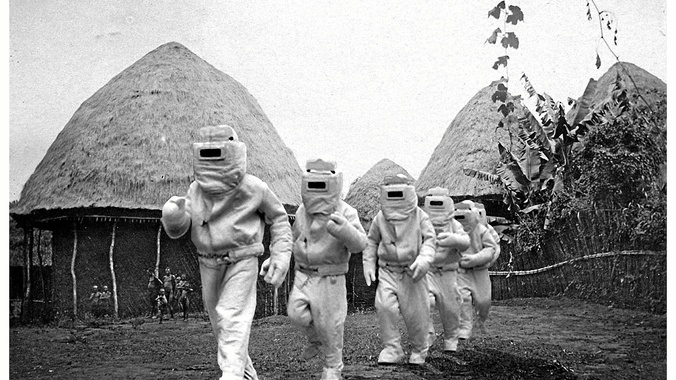Photographer Cristina De Middel’s trip to Nigeria has been profitable. Not only did she exhibit her acclaimed series The Afronauts but also was inspired for her next project.
Tucked away in her suitcase as she left the country’s commercial capital Lagos for Paris last week was a copy of Nigerian author Amos Tutuola’s 1954 novel My Life in the Bush of Ghosts.
“It’s about a child who has to flee his village because of war and goes into this magical place called ‘the bush’, a mystical place in Yoruba mythology where all the ghosts and spirits live,” the 38-year-old Spanish photographer told AFP.
“I realised straight away that [the slum neighbourhood of] Makoko could be a great metaphor for ‘the bush’ – a magical place with laws that we don’t understand and shouldn’t be.”
During her time in the teeming megacity, De Middel paid a visit to sprawling Makoko, much of which rises up on bamboo stilts out of the oily Lagos lagoon and is home to hundreds of thousands of people.
As if by magic, her project took shape.
Spooks and ghouls
Over four days, De Middel’s imagined ghosts and spirits came alive with the help of local volunteers, market-bought costumes and cheap Halloween accessories brought from London.
In one image, a “ghost” made from an old curtain rises up hauntingly amid the ramshackle, tin-roofed huts and in another seemingly hangs from a sagging washing line.
A third frame shows plastic joke shop spiders, beetles and flies “crawling” over the face of a young man while a mirrored landscape captures the ethereal quality of Makoko through burning wood smoke and a leaden sky.

De Middel was in Nigeria for the fourth edition of Lagos Photo, the annual festival that increasingly attracts some of the biggest names in world photography.
This year her celebrated The Afronauts was shown alongside new works by Cameroon’s Samuel Fosso, known for taking chameleon-like photos of himself dressed as a range of figures from black African and American life.
The former newspaper photographer is finding her own voice in the art world, blurring the lines between fact and fiction with the aim of taking people out of their comfort zone.
The Afronauts was born as she surfed the internet one day and stumbled across an article on an improbable space programme mounted by Zambia in 1964.
“I realised straight away that it was an incredible story that allowed me to play a lot with the photos and give a different point of view about Africa” beyond the old stereotypes of war and famine, she explained.
A storyboard was quickly drawn up of a fantasy adventure in space.
Worldwide acclaim
De Middel was not put off by her lack of knowledge of either Africa or space and instead drew on her own catalogue of cliches, from elephants, African material and the arid climate to the first steps on the moon and spacecraft.
The result was a self-published book featuring photographs of African astronauts in colourful space suits, compiled with letters and articles from the time.
One thousand copies of the book were quickly snapped up, helped by the backing of leading British photographer and collector Martin Parr, who was won over by the project.
The Afronauts has now been shown about 20 times across the globe and won its creator the prestigious International Center of Photography (ICP) prize in New York and a nomination for the 2013 Deutsche Boerse award.
A film, co-produced with the Catalan photographer and documentary maker Pep Bonet, is currently in the works.
Every overseas showing has been a chance for De Middel to explore new ideas, as in China where she came back with Party, her own version of Mao Zedong’s Little Red Book
De Middel said the compilation, which was shown at at the annual Paris Photo festival (November 14-17) , was “an adaptation of the communist bible”, containing extracts from Chairman Mao’s book and scenes of modern everyday life in the Asian giant.
She admitted, though, that globe-trotting has taken its toll – not least on where she now calls “home”.
“I’m based in London but I haven’t spent more than 20 days there this year,” she said over tea in a Lagos hotel.
But living out of a suitcase could yet be profitable, as the sketches and doodles in her precious notebooks magically come to life.
